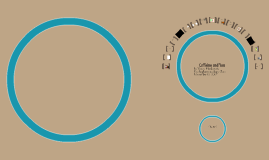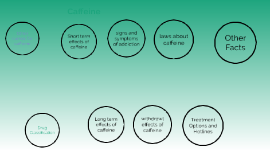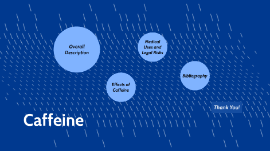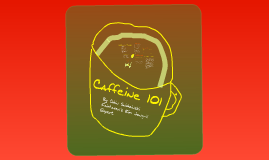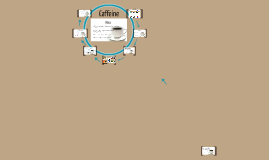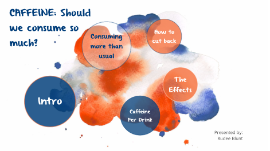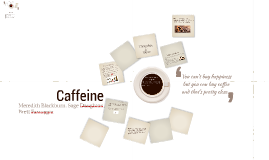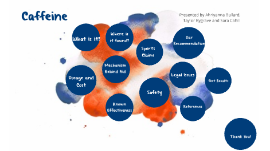Caffeine Presentation
Transcript: Thank You! Caffeine Description Overall Description Caffeine is categorized as a psychostimulant and under drug schedule III. Its main method of use is through food and drink consumption such as coffee, tea, sodas, chocolate, and many others. It is also an ingredient in many over-the-counter medicines. Caffeine has no street names. Caffeine can be obtained through stores, restaurants, bars, and many other places since it is legal. Did you know? Caffeine is consumed daily by 90% of the world's people. Roughly 80% of U.S. adults consume caffeine every day. Short and Long Term Effects - stimulating effect on the central nervous system, heart, blood vessels, and kidneys. -mild diuretic -irritability, nervousness or anxiety -headaches and insomnia -dehydration -delays the time it takes for the consumer to fall asleep and reduces depth and quality of sleep Effects of Caffeine Long Term -dizziness and ringing in the ears -muscle tremors -weakness and fatigue -rapid heart rate and quickened breathing rate -poor appetite, nausea, vomiting and diarrhea -irregular heart rate or rhythm -low blood pressure -confusion or delirium. -increased risk of heart disease Effects on Unborn Child Effects on Pregnancy -It is suspected that a consistent large daily intake of caffeine increases the risks of miscarriages. -2-3 cups of coffee have no effects, while 10 cups or more appear to cause the children after birth to be more fussy and irritable. -It is recommended for pregnant mothers to cut caffeine out completely For context: 14% of caffeine users consume more than 400mg or 4-5 cups of coffee per day. Addiction Withdrawal Addiction and Withdrawal Local and National Help The Mayo Clinic and many other national websites, clinics, or hospitals offer tips on how to cut down on or withdraw from caffeine effectively. If withdrawal ever gets to the point where you are in danger, local help can be any hospital near you or the Pittsburgh Poison Center. Legally and medically, caffeine is not recognized as a dangerously addictive substance. However, although it is not considered addictive there are still mild withdrawal symptoms. Withdrawal is not considered dangerous but more so unpleasant. Listed below are some common caffeine withdrawal symptoms: -headache -marked fatigue or drowsiness -dysphoric, depressed mood or irritability -difficulty concentrating -flu-like symptoms (nausea, vomiting or muscle pain/stiffness). Treatment Methods As mentioned above, many places offer tips on how to effectively withdraw from caffeine. The most common way for caffeine withdrawal is to gradually wean oneself from caffeine in order to minimize any symptoms by tapering off slowly and substituting cups of caffeinated drinks with decaffeinated varieties or other caffeine-free beverages. Withdrawal is not harmful: Only 11% in a case study reported withdrawal symptoms from stopping caffeine intake, and only 3% said their symptoms interfered with daily living. Medical Uses of Caffeine Medical Uses and Legal Risks Caffeine is available by prescription as a solution of caffeine citrate. Caffeine is also an active ingredient in many headache medicines, both by prescription and sold over the counter, as well as in nonprescription aids and herbal preparations for alertness and dieting. Caffeine is also approved as a prescription drug for treating premature infants who are born before their lungs and brain are mature enough for automatic breathing. These babies may have a condition called apnea, in which they cease breathing, which could cause damage to the brain and other organs. Caffeine has been demonstrated to aid in keeping premature babies breathing regularly. There are no legal consequences since caffeine is not a seriously addictive drug and is considered nation-wide as legal. Legal Risks of Caffeine Sources Bibliography American Psychiatric Association. Diagnostic and Statistical Manual of Mental Disorders. 5th ed. Washington: American Psychiatric Publishing, 2013. Blachford, Stacey L., and Kristine Krapp, eds. Drugs and Controlled Substances: Information for Students. Detroit, MI: Gale, 2003. https://go.gale.com/ps/eToc.do?searchType=BasicSearchForm&docId=GALE%7C0OPX&userGroupName=pitt94721&inPS=true&action=DO_BROWSE_ETOC&contentSegment=9780787677312&prodId=GVRL. "Butalbital, Aspirin, and Caffeine." Last modified September 13, 2019. https://dailymed.nlm.nih.gov/dailymed/lookup.cfm?setid=e31096f4-162f-44bd-a211-9c2873acfe54. "Caffeine." Encyclopaedia Britannica Online. https://school.eb.com/levels/high/article/caffeine/18535. "Caffeine." National Center for Biotechnology Information. National Center for Biotechnology Information. PubChem Database. Caffeine, CID=2519, https://pubchem.ncbi.nlm.nih.gov/compound/Caffeine (accessed on Apr. 14, 2020). "Caffeine: How much is too much?" Mayo Clinic. https://www.mayoclinic.org/healthy-lifestyle/nutrition-and-healthy-eating/in-depth/art-20045678. "Caffeine in Pregnancy." March of Dimes. Accessed April 14, 2020.






